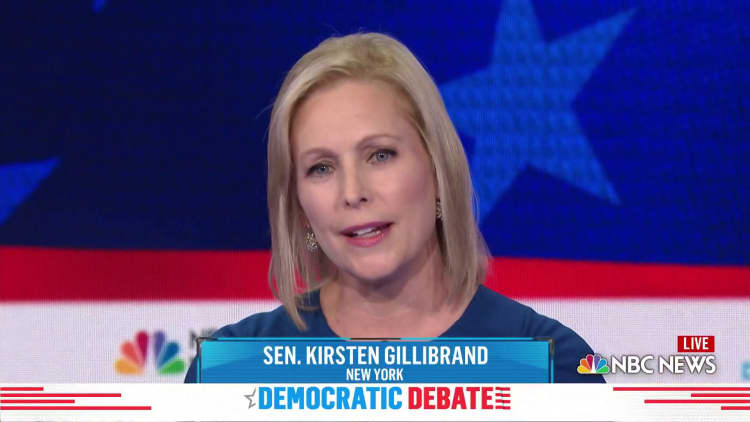Sen. Kirsten Gillibrand, D-N.Y., dropped out of the 2020 presidential race Wednesday, ending a campaign weighed down by fundraising problems and a lack of public support.
Gillibrand's decision to drop out of the race comes after she failed to qualify for the third Democratic debate on Sept. 12 in Houston.
Today, I am ending my campaign for president.
Gillibrand had positioned herself as a progressive and the strongest advocate for women's issues among the Democratic field, which at its peak included two dozen presidential candidates.
She also touted her staunch opposition to President Donald Trump, having voted against more of Trump's nominees than any Democrat in the Senate.

But the contrast between Gillibrand's progressive platform and her past conservative views as a U.S. representative in upstate New York gave her critics ammunition.
She sold her 2006 win in a Republican-held district as evidence that she could garner bipartisan support in a presidential election. But at the time, she ran as a fiscally conservative, pro-gun Democrat who was reportedly against "amnesty for illegal immigrants." In 2018, she said she was "embarrassed" about her past positions and that they were "wrong."
Gillibrand didn't officially launch her campaign until March, but she announced in January on "The Late Show with Stephen Colbert" that she would run for the White House.
"I'm going to run for president of the United States because as a young mom, I'm going to fight for other people's kids as hard as I would fight for my own," she told Colbert.
Gillibrand received national attention when she became the first Democrat in the Senate to call on former Minnesota Sen. Al Franken to step down amid allegations of sexual misconduct from multiple women. More than two dozen Senate Democrats followed suit, and Franken quickly vacated his seat while denying most of the allegations against him. Some in the party later resented Gillibrand's outspoken condemnation of her colleague.
Though Gillibrand had $10 million left over from her 2018 Senate run, she struggled to raise money for her presidential campaign.
The list of donors she had amassed evaporated following her announcement in January, The New York Times reported. And despite her head start on outreach to big-money donors, her quarterly fundraising numbers were lackluster: Gillibrand posted $3 million in the first fiscal quarter, placing her near the bottom of the pack. She raised $2.3 million in the following quarter.
Gillibrand's campaign never gained traction, according to national polls. The RealClearPolitics rolling average, for instance, show Gillibrand mostly below 2% support throughout 2019.


